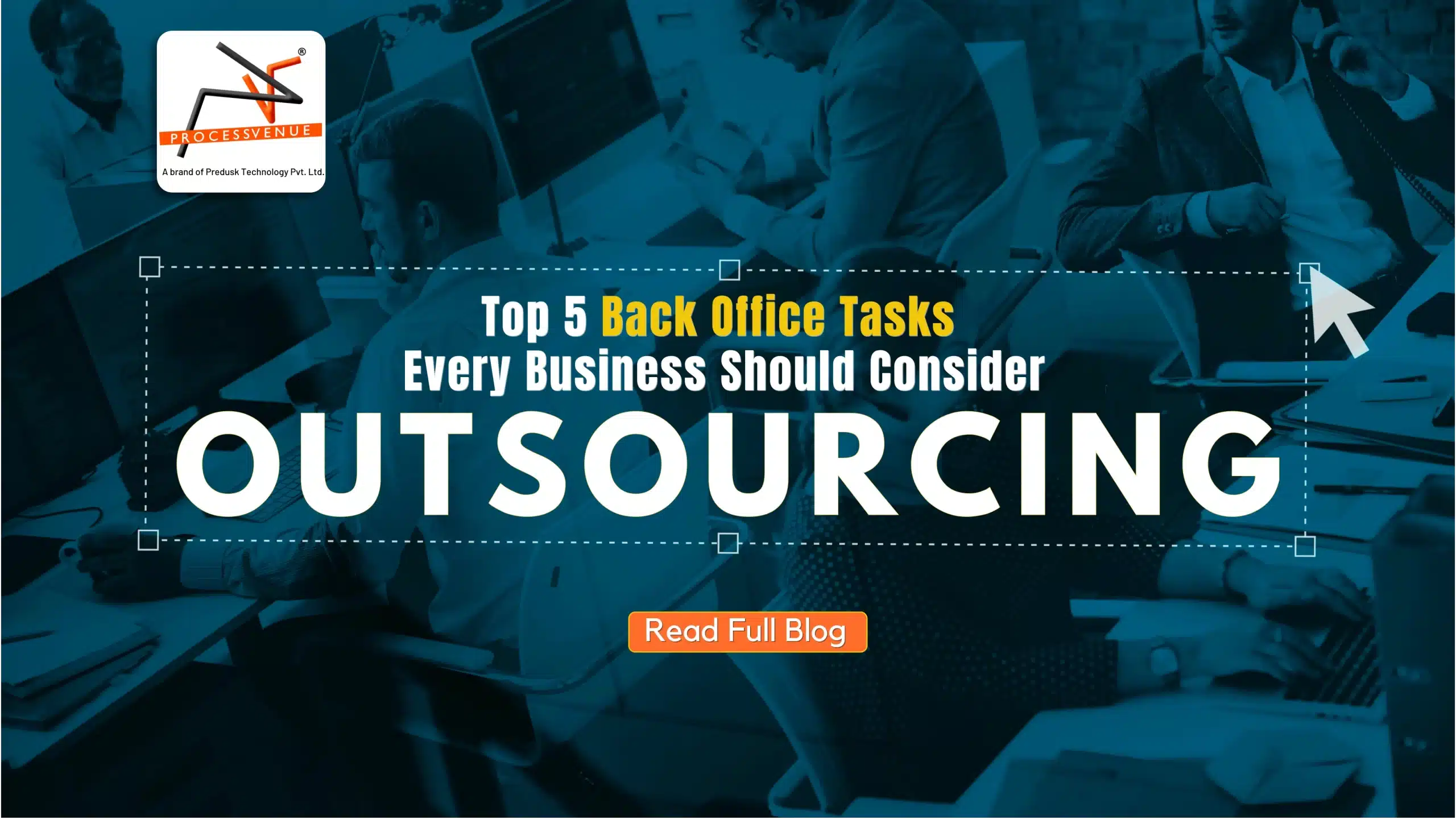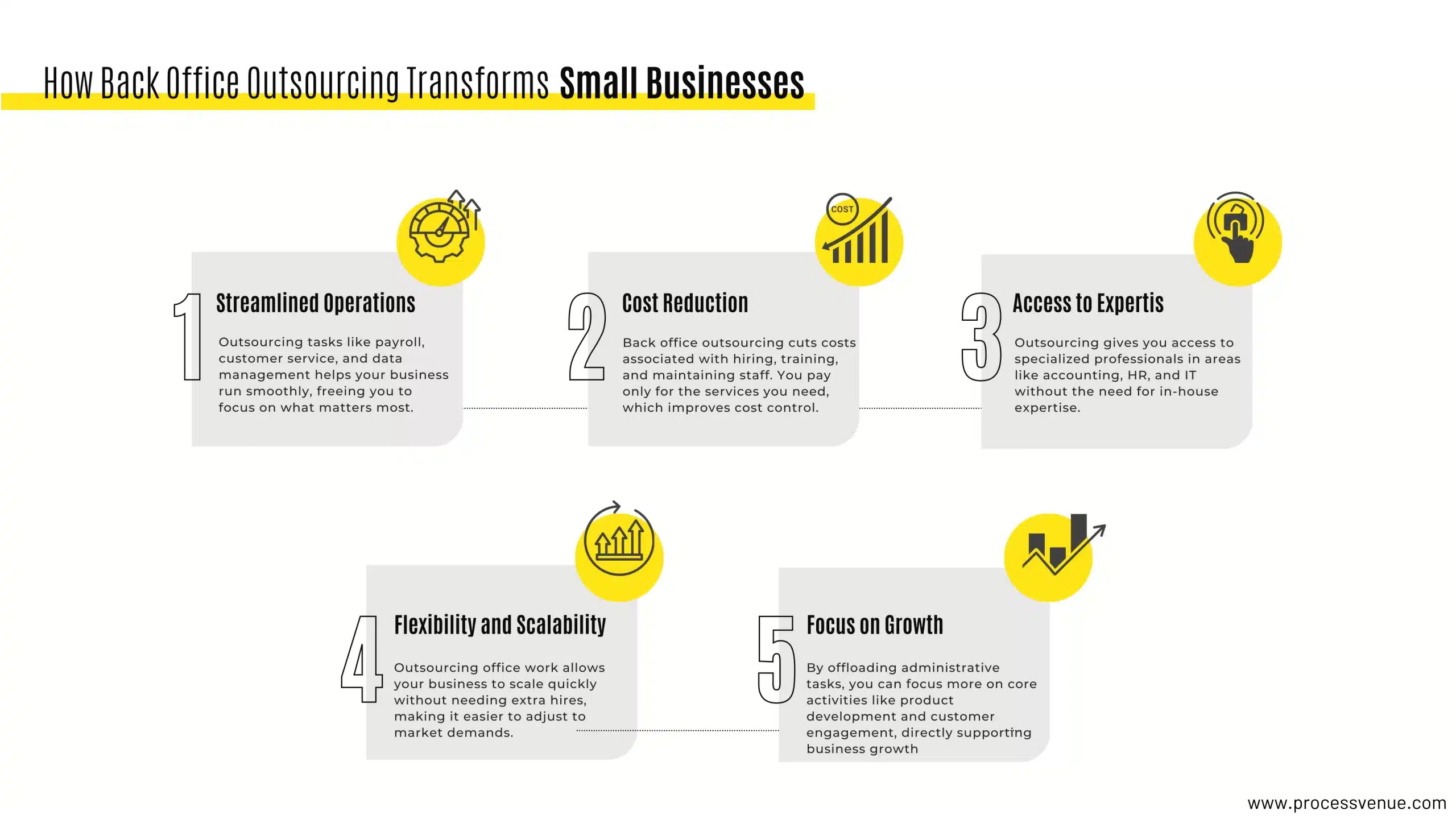
Top 5 Back Office Tasks Every Business Should Consider Outsourcing
Outsourcing back-office operations can significantly improve your business efficiency. Many businesses, especially small and medium ones, find it challenging to manage non-core activities while focusing on growth. Outsourcing allows you to delegate tasks like accounting, customer support, and data entry to specialized service providers, ensuring better performance and cost savings. Let’s explore what outsourcing can do for your business.
What Is Outsourcing?
Outsourcing refers to the practice of hiring an external company or service provider to handle tasks that would otherwise be done in-house. This can involve back-office business process outsourcing (BPO) for tasks like customer support, accounting, or IT services. Businesses choose to outsource office services to save time, reduce costs, and leverage expertise without the need to hire full-time employees.
Benefits of Outsourcing
Outsourcing your back office functions comes with many advantages, including:
- Cost savings: Outsourcing back office outsourcing can reduce labor and operational costs.
- Focus on core tasks: It allows your business to focus on what you do best while delegating time-consuming tasks to experts.
- Expertise: You gain access to specialized skills and technology without investing in training or equipment.
Why Outsourcing Back Office Tasks is Critical for Business Growth
When you outsource back-office operations, you can streamline processes and improve productivity. It helps businesses stay agile, reduce overhead costs, and scale efficiently. BPO back office partners handle non-core tasks such as accounting, HR, and data management, allowing you to focus on growing your business. The result is better customer service, more time for innovation, and improved business performance.
Key Back Office Tasks to Outsource
Outsourcing the right back office tasks can help your business run more efficiently and focus on its core objectives. Here are key areas you can consider:
1. AI and Machine Learning for Data Insights
Outsource tasks related to data analysis using AI and machine learning. These technologies can help you gain valuable insights into your business, customer behavior, and market trends without the need to build an in-house team.
2. Streamline Accounting and Financial Services
Managing finances is crucial but time-consuming. Outsourcing accounting and financial services, like bookkeeping, tax preparation, and payroll, allows you to focus on growth while ensuring accuracy and compliance.
3. Enhance Customer Support Services
Outsource customer support to improve response times and service quality. BPO partners can handle inquiries, complaints, and troubleshooting, allowing your team to focus on more strategic tasks.
4. Virtual Assistants and Research Services
Virtual assistants can take care of administrative tasks such as scheduling, email management, and data entry. You can also outsource research tasks, helping you gather market information or perform competitor analysis quickly.
5. Digital Marketing and Social Media Management
Outsource digital marketing services, including content creation, SEO, and social media management. This can help you maintain a strong online presence and engage with customers while focusing on other business areas.
How to Choose the Right Outsourcing Partner for Your Business Needs
Choosing the right outsourcing partner is crucial for your business’s success. Here’s how to make sure you find the right fit:
1. Understand Your Business Needs
Before looking for an outsourcing partner, assess your business requirements. Identify tasks or functions that are not part of your core operations but still need attention. This will help you find a partner who aligns with your needs and goals.
2. Choose the Right Outsourcing Partner
Look for a partner with experience in the areas you need. Check their reputation, reviews, and previous work to ensure they have the expertise to handle your tasks. Consider factors like their technology, scalability, and reliability to ensure they meet your expectations.
3. Focus on Clear Communication and SLAs
Establish clear communication channels and set expectations right from the start. Agree on Service Level Agreements (SLAs) to define the quality of service, timelines, and performance metrics. This ensures both parties understand what is expected and helps avoid misunderstandings.
How Back Office Outsourcing Transforms Small Businesses
Back-office outsourcing can significantly benefit small businesses by streamlining operations, reducing costs, and allowing you to focus on growth. Here’s how:
- Streamlined Operations: Outsourcing tasks like payroll, customer service, and data management helps your business run smoothly, freeing you to focus on what matters most.
- Cost Reduction: Back office outsourcing cuts costs associated with hiring, training, and maintaining staff. You pay only for the services you need, which improves cost control.
- Access to Expertise: Outsourcing gives you access to specialized professionals in areas like accounting, HR, and IT without the need for in-house expertise.
- Flexibility and Scalability: Outsourcing office work allows your business to scale quickly without needing extra hires, making it easier to adjust to market demands.
- Focus on Growth: By offloading administrative tasks, you can focus more on core activities like product development and customer engagement, directly supporting business growth.
The Advantages of Outsourcing Back Office Tasks
Outsourcing your back-office tasks can significantly benefit your business. Whether you need help with routine administrative work or specialized functions, outsourcing can improve efficiency, reduce costs, and allow your business to grow without the added burden of managing everything in-house.
Cost Savings
Outsourcing back-office functions like payroll, data entry, or customer support can reduce operational costs. With back-office outsourcing, you don’t need to hire full-time staff or invest in expensive infrastructure. This leads to lower overhead costs, allowing you to allocate resources to other areas of your business.
Scalability
As your business grows, so do your needs. Outsourcing back-office operations lets you scale your operations up or down quickly. You can add new services or reduce tasks without the hassle of hiring or laying off employees. This gives you the flexibility to grow without worrying about resource constraints.
Access to Expertise
When you choose a BPO back office provider, you gain access to a team of skilled professionals. These experts bring specialized knowledge in areas like finance, HR, and IT. This can improve the quality of services provided and free you from the need to train and manage employees.
Increased Focus on Core Business
Outsourcing back office business process outsourcing allows you to focus more on the core aspects of your business. You can direct your time and energy to strategy, growth, and customer engagement while leaving administrative tasks to professionals. This helps improve productivity and overall business performance.
Considerations Before Outsourcing
Before deciding to outsource your back-office operations, it’s essential to consider a few key factors that could impact your business. These considerations can help ensure that outsourcing brings value and aligns with your company’s needs.
Data Security
Outsourcing often involves sharing sensitive data with external vendors. It’s crucial to confirm that the third-party provider has strong security protocols in place to protect your information. Look for vendors that comply with international security standards and are transparent about how they handle data. This reduces the risk of data breaches or loss.
Cultural and Time Zone Compatibility
Cultural differences and time zone mismatches can affect communication and collaboration. Ensure that the outsourced back office services provider understands your company’s values and that their working hours align with yours. This will help reduce misunderstandings and keep operations running smoothly.
Flexibility
Your business needs may change over time. Choose a BPO back office provider that offers flexibility in adjusting services to meet new demands. This flexibility will allow you to scale operations up or down without disruption and adapt quickly to new business requirements.
Conclusion
Outsourcing back office operations is a strategic move that can significantly boost your business efficiency and growth. By delegating tasks like accounting, customer support, and data management to experts, you free up valuable time and resources.
This allows your team to focus on core functions that drive your business forward. Consider outsourcing these tasks to streamline your processes, reduce costs, and gain access to specialized skills that will contribute to your long-term success.
FAQs
What is the relationship between finance and accounting?
Finance focuses on managing and planning the future use of funds while accounting deals with recording and reporting past financial transactions. Together, they provide a complete picture of a company’s financial health and help with decision-making.
In which way is accounting different from finance?
Accounting focuses on recording and reporting financial data, ensuring accuracy and compliance. Finance, on the other hand, is concerned with planning, managing, and analyzing funds to achieve a company’s financial goals.
How does finance differ between personal, corporate, and public sectors?
Personal finance focuses on budgeting, saving, and investing for individuals. On the other hand, corporate finance deals with managing business financial resources, including investments, funding, and profitability. In contrast, public finance involves managing a government’s revenue and spending to benefit the public.
How does management accounting help businesses make decisions?
Management accounting provides detailed financial data and insights to help businesses with budgeting, cost control, and long-term planning. It aids decision-making by offering information on profitability, operational efficiency, and financial projections.

